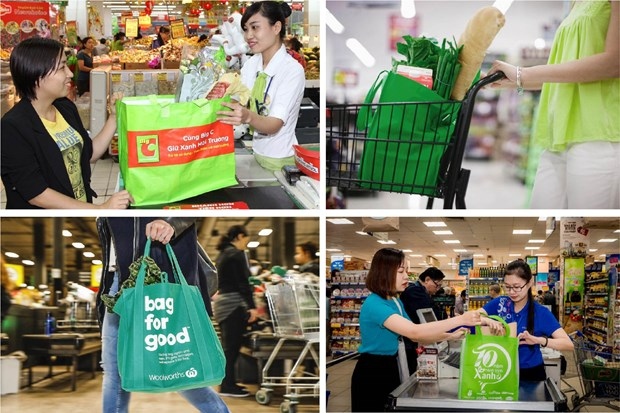Vietnam promotes sustainable production, consumption
The trend of sustainable consumption, with environmentally friendly products, has received increasing attention in Vietnam and created an influence on the production and distribution system.

From his practical experience, CEO of Go/BigC System in Hanoi and the northern region Le Manh Phong said that over the recent years, the trend of sustainable consumption in the country has been becoming more and more obvious, as a product with an environmentally friendly production or packaging process often brings more advantages to the business in its competition.
According to a recent report by the Thai-owned BigC – one of the biggest supermarket chains in Vietnam, 31% of the customers are willing to pay more for products that support the environmental protection.
Therefore, many Vietnamese enterprises, especially large ones, have begun to shift their products in the direction of being environmentally friendly.
As a pioneer in implementing the circular economy model, Vijay Kumar Pandey, Chairman of the TH Milk Food JSC (THMF), said that in the production chain of TH Group, by-products and waste of a process are used as input materials for another, so the life cycle of the material is maintained as long as possible before being discharged into the environment, thereby minimising gas emissions.
In addition, the group has also implemented many sustainable consumption solutions such as replacing disposable plastic bags, spoons and straws with eco-friendly bio-plastic ones. In 2022, the TH True Mart system cut the total number of used plastic bags by 15%, equivalent to 19 tonnes.
In addition, it also cut by half of the amount of plastic spoons distributed to the market, and aims to raising the figure to 100% in the near future. The complete elimination of disposable plastic spoons is expected to help reduce from 130 to 260 tonnes of plastic waste into the environment each year.
From the beginning of this year’s second quarter, some retail businesses, and ride-hailing service and food delivery providers in Vietnam began to convert from petrol to electric vehicles (EVs).
According to a study by Baemin - a food delivery service provider from the Republic of Korea, using EVs helps save fuel costs and save 50% of maintenance costs. This will help Baemin reduce its operating costs by up to 30% if it successfully uses EVs in its transportation service.
Assessing sustainable consumption trends in online shopping, Baemin Vietnam CEO Song Jinwoo said that Vietnamese consumers are paying great attention to sustainable products which are made from recycled or reusable materials. In addition, they also tend to choose dishes that are low in fat and sugar, and rich in fiber and nutrition. This is reflected in the growth in the number of stores offering healthy products.
In the first half of this year, the increase rate was 15% compared to the same period last year. But at present, in fact, customers' demand for environmentally friendly products is still not high as their prices remain the leading factor.
In the coming time, when the economy stabilises again, the trend of sustainable production and consumption will develop strongly, according to insiders.

